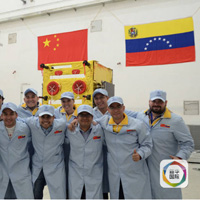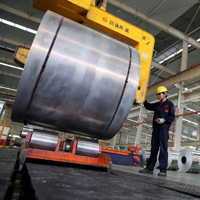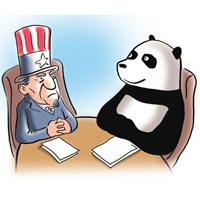- 当前位置:
- 首页>
- 活动>
- ���������������
���������������
CCG持续关注国际关系议题,推动中国与全球化的发展,积极开展国际交流,充分发挥智库“二轨外交”作用,在巴黎和平论坛、达沃斯世界经济论坛、慕尼黑安全会议等重要国际政策与意见交流平台上组织分论坛、边会、圆桌会议、晚宴等活动,促进国际政商学界对话,凝聚共识;CCG积极与各国政界、智库界、工商界开展“二轨外交”活动,每年常态化赴多国调研与交流,促进中外关系攸关方互动,保持与多国政策圈层的沟通渠道。
-

【Global Times】Situation in Venezuela serves as warning for overseas investment
The continually worsening social and economic conditions in Venezuela have reinforced fears that the oil-rich country, once the wealthiest in Latin America, could be on the verge of a civil war. This could well put China’s massive commitments to the country at stake, and it should serve as a wake-up call for more rigorous evaluation of the uncertainties and risks involved in investing beyond the Chinese mainland, particularly along the route of the "Belt and Road" (B&R) initiative, which includes some volatile countries and regions.China should not just put irrational overseas acquisitions in the crosshairs, which it is already doing to guard the nation against systemic financial risk, but should give higher priority to political risk assessments, which are crucial for China to safeguard its overseas investment.Projects in political risky and unstable countries could present unexpected challenges. Abrupt deterioration of the political situations in these countries could easily turn investments into bad loans. Therefore, security threats in certain parts of the world should be considered thoroughly before investment is made in these areas.Chinese businesses already cite political risk as the top concern in investing abroad. A survey of 300 Chinese companies by the Center for China and Globalization(CCG), a Beijing-based think tank, showed in November that more than 70 percent of the respondents selected political risk factors such as policy changes and political unrest as their top concern about investment beyond the home turf.It’s not enough for Chinese businesses to raise their awareness of the need to measure political risks before investing in politically unstable markets. There should also be ramped-up efforts by the Chinese government to improve the evaluation of potential pitfalls of investing in politically turbulent countries. In the case of Venezuela where China’s policy banks, notably the China Development Bank, have made huge commitments, the situation in the South American country would be of less concern if Chinese regulators had conducted a thorough evaluation of the risk involved in continuing to put money into the country and issued investment warnings accordingly.With China actively pushing for investment along the route of the B&R, which encompasses more than 60 countries and regions, some of which are politically unstable, it is all the more important for Chinese businesses and regulators to evaluate their efforts to insulate overseas investments from political risk.(By Xiao Xin) From Global Times,2017-8-8
2017年8月14日 -
郑永年:中国财富去哪儿了?
专家简介郑永年,CCG学术委员会主任、新加坡国立大学东亚研究所所长。财富流向海外的现象已经持续了很多年,至今没有减缓的迹象。在政府控制外汇的时候收敛一下,一旦控制放松就会恢复常态。01贫穷社会主义改革开放之后,中国社会很快找到了发财致富的有效手段——引入市场机制。在很短的时间里,市场机制为中国社会创造了巨量财富。中国从上世纪70年代末的贫穷国家(或者“贫穷社会主义”),跃升为世界上仅次于美国的第二大经济体和世界上最大的贸易国;即使就人均国民所得而言,也从当时人均不到300美元提升到今天的近9000美元,大部分人口拥有包括住房那样的资产。这样的成就在世界经济史上罕见,因此被称为世界经济奇迹。不过,从总体社会结构上看,中国的中产阶层还很小,社会底部仍然巨大,也就是说,中国还没有形成“两头小、中间大”的橄榄型社会,即学术界所说的“中产社会”。更重要的是,中国还没有建立一个需要大量财富支撑的社会保障制度。这也是近年来人们争论中国会不会陷入“中等收入陷阱”的原因。亚洲那些成功越过中等收入陷阱的经济体,即早先的日本和后来的“四小龙”(韩国、新加坡、台湾和香港),在经济起飞的30多年时间里,不仅实现了经济奇迹,从贫穷经济体提升为发达经济体(即高收入经济体),还实现了社会奇迹,即培养了占这些经济体70%的庞大中产阶层。相比之下,尽管中国的改革开放将近40年,取得了同样的经济奇迹,但社会奇迹并没有出现。中产社会没有形成的主要原因,是国家的收入分配机制出了问题,即财富集中在绝少数人手中。因为中国社会人口巨大,这部分“绝少数人”的绝对数量也不少。不难理解,从海外看中国,中国俨然已是一个富裕社会。这种印象当然是虚假的,因为中国社会收入差异巨大。日本和“四小龙”的社会奇迹,是由这些经济体的有效收入分配机制所造就的,即这些经济体都实现了公平的经济增长,在高速经济增长过程中,没有出现巨大的收入差异。不过,1990年代以来,受新自由主义经济学的影响,这些经济体也开始出现很大的收入分配差异。02财富去哪了 直到今天,中国社会大部分还是处于低收入甚至贫穷状态。近年来进行的“精准扶贫”运动很好说明了这一点。1980年代开始的改革,曾经使数亿人脱离了贫穷,但今天仍有很大规模的贫穷人口;除了原来没有脱贫的人口之外,新的贫穷人口也在出现。在任何社会,中产阶层是财富的“载体”。中产阶层没有壮大,表明财富没有积累起来而流失了。国家财富去了哪里呢?实际上,研究中国财富的去向(或者流向),甚至比研究财富的获得更为重要。创造财富固然重要,但保护财富更为重要。如果没有有效的财富保护机制,所创造的财富就会流失。中国的财富流向至少可以从如下几个方面来考量。第一,财富向海外流出。财富流向海外的现象已经持续了很多年,至今没有减缓的迹象。在政府控制外汇的时候收敛一下,一旦控制放松就会恢复常态。无论是对外投资、购置不动产,还是存入外国银行或其他形态,归根究底,财富离开中国而长驻海外。第二,财富到处流转和折腾。财富在海内外倒来倒去,换一个名称,内资变外资。很多中国企业一旦做大了,就到海外注册成为海外企业,但实际上海外也没有多少赚钱的机会,就再到中国投资赚钱。这种身份转换尽管可能并没有转换主人,但财富已经不属于中国。第三,财富的浪费。财富的浪费是惊人的。很多企业因为种种原因到海外投资,但海外并不能找到理想的投资环境,造成损失,甚至是完全的失败。这既有国有企业,也有民营企业。其中,国企在海外的亏损尤其引人注目。国企“走出去”有其必要性,但往往低估了当地社会的政治经济风险,甚至光考虑政治需要,而忽视了经济要素。国企在俄罗斯、白俄罗斯、委内瑞拉、斯里兰卡、缅甸等国的大额投资,往往因为政治或经济形势的变化而严重亏损。在“一带一路”推动下,国企更是获得了走向国际的巨大“动力”,但如果不能有效控制风险,财富浪费会是惊人的。国内的国企也一直在消耗着大量的国家财富。很多国企尤其是地方国企,尽管有大量的亏损,但没有倒闭。无论用财政还是金融方法来弥补亏损,都是在消耗财富,因为政府的钱不管用什么方式获取,最终还是来自老百姓。第四,各种类型的腐败。正如中共十八大以来的反腐败运动所揭示的,中国腐败的深度、广度和额度都是史无前例的。腐败不仅干扰正常的经济生活,影响财富的创造,更造成财富的巨大浪费。就官员来说,因腐败而得来的“财富”是死的,既不敢消费,也不敢存入银行,往往是东藏西藏。03财富需要法律保障 如何理解中国的财富行为呢?这里的因素也很多,但如下几个方面是可以考量的。第一,没有有效的法治保障,财富缺少安全感。尽管改革开放以来,中国在建设法制和法治方面努力不少,但建立和建设一个完善的法治体系需要很长的时间。再者,即使执政党在理论上一直强调法治,但落实到具体执行时,很多党政官员缺乏法治观念,对财富(财富的拥有者)“乱作为”。更为重要的是,近年来,意识导向出现问题,财富更感不安全。无论是投资者还是上层中产,只要有机会,就拼命往海外跑。李嘉诚就是一个典型的例子,而且像李嘉诚那样的商人绝非少数。第二,缺少社会公平。收入差距过大,社会过于分化。改革开放以来,中国所引入的可以说是原始市场机制,需要政府确立的社会保护机制不足,甚至没有到位。在这种情况下,市场创造的大量财富流向绝少数人,而大部分人没有获得应当得到的财富,少部分人甚至成为牺牲品。尽管这种情况并非中国所独有,世界各国都是如此,但中国贫穷人口过大,部分人仇富心理很浓,资本和财富对“均贫富”和“劫富济贫”的传统实践产生恐惧心理。从1980年代到现在,政府进行了大规模的扶贫运动,也不能说不重视社会政策建设,但没有从根本上改变社会不公平的情况。只要这种情况继续,社会的激进思想就不会停止。而激进思潮的存在对财富是一种威胁,世界各国都是如此。第三,公权力没有限制或不作为。法治不健全就决定了公权力没有限制。在公权力面前,更多的财富也无济于事。尽管改革开放以来,政府总体上“亲商”,但这种“亲商”往往以腐败为前提,即官员和商人的关系表现为“吃了你的、喝了你的、拿了你的,就得为你办事”。官员对商人往往是一种掠夺关系,前者经常直接向后者要钱。在很多地方,政商关系一直没有走出传统的“一朝天子一朝商”的恶性循环,领导人一变动会导致一大批商人的“死亡”。除了权力对财富的掠夺,公权力的不作为也影响财富的创造和安全。在法治不健全的情况下,财富需要寻求政治权力的保护,但一旦掌权者失去提供保护的动机,财富很快就会感到不安全。例如在反腐败的高压下,一些官员的态度变成“不吃你的、不喝你的、不拿你的,为什么要为你做事”。再者,反腐败运动以来,几乎每一个腐败官员都可以牵出一大批商人,商人感到不安全,就连带其财富出走国外。第四,没有有效的监管。这也是政府失责的结果。至少有两个结果:一,没有有效的监管,市场经济盛行“大鱼吃小鱼”的现象,金融业和互联网企业大肆收购实体企业,导致金融、互联网、房地产业和实体经济之间的失衡。也就是说,实体经济所创造的财富被不当收购。二,政府为了鼓励发展新兴产业,往往简单地通过不监管的办法任其发展。这种无政府状态下的发展最终必然出现大问题。一旦出了大问题,政府又简单地采用粗暴的方法,用行政力量关停企业、“抓人”等办法来整治它们,造成财富的大浪费。第五,财富本身失去方向。资本的本质是自我积累和扩张。在中国,这种简单的积累和扩张并不可行。企业长大到一定程度,必然产生不正当的政商关系,因为政府不放心企业财富的“政治化”,企业需要政府的支持进行再扩张。在西方,企业可以向慈善发展。中国的慈善文化还没有发展起来。慈善的不发达不仅仅是企业家层面的问题,更是政府层面的问题,例如有关慈善的税收体制不完善。实际上,即使财富进入了慈善领域,政府也有很多理由不放心。04多管道留住财富如何留住财富呢?明白了上述财富流失的根源,这个问题也不难回答。可以从如下几个方面来看。第一,加紧建设法制与法治。这是根本,因为市场经济的本质就是法治经济。市场与法治的关系人们已经讨论很多,似乎不用多说了。第二,追求公正社会。不仅要加紧社会政策建设,而且要尽快推行房地产税、遗产税等有利于社会公平的政策。一个高度分化的社会即不安全,法治也没有任何社会保障。第三,建立新型政商关系。原来腐败的政商关系不可行,现在已经提出要建立“亲、清”的政商关系。如何把这个目标落实到制度层面呢?第四,建立有效的监管制度。政府放任企业在无政府状态中发展并不是“亲商”,因为最终当企业出现了问题,有关部门必将粗暴地对待,甚至加害于企业。财富的创造和积累有待有效的监管。第五,通过实行“基金制度”等方法来解决“富不过三代”的问题。引入基金制度等可以实现财富的“所有权”和“管理权”分离,让专业人员管理财富,避免财富处于纯“消费”状态。发达国家在这方面已积累很丰富的经验,不难引入。一个穷人占多数的社会永远是不稳定的,所以古人言,“有恒产者有恒心”。“恒产者”即中产者。无论是穷人的减少,还是中产阶层的壮大,都关乎财富。没有有效的财富保护机制和没有有效的财富创造机制,一样很难保证国家能跳出中等收入陷阱,更不用说进入高收入社会了。在找到创造财富的机制后,人们更须找到有效的财富保护机制。实际上,只要同时拥有两者,一个国家的经济才可以实现可持续的发展。文章选自IPP评论,2017年8月8日
2017年8月14日 -
钱颖一:AI时代科技又将成为主角
钱颖一,全球化智库(CCG)学术委员会专家,清华大学管理学院院长。 近日,“院长下午茶MBA学生专场”在清华经管学院舜德楼MBA学生活动室举行。全球MBA项目(GMBA)的英文场和MBA在职项目(P班)的中文场分别参加了本次活动。 开展创新创业课 举办商业计划赛 经过逐一自我介绍之后,钱颖一院长和来自GMBA项目的学生就将话题聚焦于刚刚结束的《创新与创业:硅谷洞察》课程以及在最后一堂课上举行的商业计划十强赛。在谈到关于该们课程学习感受时,有的说这门课程让他更加深入了解了Facebook公司的创新精神、先进理念与技术;有的说最后一堂课关于创业成功的因素让他印象深刻;还有的说,同学们在课上交流创业想法,能够启发彼此。参加本次下午茶活动的MBA学生中有3个团队进入十强赛。其中2016级G班同学的“Akkadu”翻译项目与来自P班的使用机器人创作音乐的 “Deep music”项目并列获得大赛二等奖,专做癌症监控“AiHrt”的项目获得一等奖。同学们普遍认为,“十强赛”的重要考核指标是课程过程中的项目成长性,优胜团队中将各专业相互融合,充分发挥跨学科优势,促进了学生的跨学科交流。钱颖一院长对此表示认同。2017年4月,马化腾与钱颖一共同启动“清华-青腾未来科技学堂” 创办科技学堂 应用人工智能 对于目前热议的人工智能(AI),钱颖一院长首先介绍了今年4月学院与腾讯公司联合创办的清华—青腾未来科技学堂,并表示:“这两年,科技发展动态与人工智能(AI)关系密切。AI与移动互联迥异之处是,移动互联重在商业模式,AI出现后科技又将成为主角。”钱颖一院长认为,AI对行业、职业颠覆性、替代性有巨大影响,搭建这一平台就是希望同学们能够充分利用清华各院系的资源,将人工智能转化运用到各个领域中去。钱颖一院长以G班学生的“Akkadu”翻译项目为例,向学生们展示AI在翻译领域的广阔前景。 了解前沿技术 解决资源问题 在交流中,同学们提到了解清华前沿技术的资源问题时,钱颖一院长提供了两种获取渠道。一是在专门给MBA学生开设的《清华新兴技术探究》课程中,同学们可以参观八个清华实验室,包括清华大学FIT楼、下一代互联网示范工程网络运行中心等,还可参观美术学院、建筑学院等;二是充分利用清华x-lab的相关资源。同学们还分享了参观李兆基科技大楼、无人机实验室的经历和感受,以及就如何充分利用校友资源、同学资源等问题与钱颖一院长进行了交流。之后,钱颖一院长询问了MBA目前的招生录取比例、申报情况、录取条件、面试的评分标准、联考备考、考前辅导等问题。同学们也分享了在延期毕业、企业参访、班级自建组织等方面的学习生活情况。 “创造一个每个人都有追求的世界”,钱颖一院长最后引用马克·扎克伯格在2017年哈佛大学毕业演讲上说的这句话来鼓励同学们要树立更高的人生目标。(图片来源网络)文章选自人民网,2017年8月10日
2017年8月14日 -

Preferential policies lure returnee entrepreneurs
A returnee from the US displays the model trains he sells on his online store in Shanghai.Photo by Nu Jing/China DailyYoung Chinese returning from study overseas are taking advantage of government incentives and starting their own businesses, as Zhang Yue reports.For the past two and a half years, Li Guanjiao has spent every day contacting potential investors, promoting her products and brainstorming design ideas with colleagues."It’s exhausting, but great fun," said the 28-year-old budding entrepreneur, in a telephone interview she fitted in between meetings with potential backers.Li studied for a master’s degree in branding at the London College of Communications from 2012 to 2014, and landed a job in the fashion and design section of a Chinese-language newspaper in the British capital straight after graduation. There, she embraced the United Kingdom’s highly-developed fashion, design and printing industry."I noticed that many countries, such as the UK and South Korea, have iconic painting styles of their own, yet Chinese cultural images and designs don’t seem straightforward and iconic enough," she said, explaining how she had the idea of starting her own company.Her brand and company is BCZW, which stands for the first letters of syllables of benchuziwu, or "prime meridian", in pinyin. It produces decorative Chinese designs, which can be screen-printed on mugs, notebooks, hats and T-shirts.The company, which has about 20 employees, is located near the Today Art Museum in Beijing, where modern art is exhibited and Li can better promote her products.In addition, she has a major promotion channel via an online store on Taobao.Li is one of a growing number of young Chinese with experience of working and studying overseas who have returned to start businesses.Growing enthusiasmIn December 2016, a report published by the Center for China and Globalization(CCG) and the Chinese Academy of Social Sciences showed that enthusiasm for entrepreneurship has soared among returnees in recent years.More than 40 percent of students who return to China to start businesses opt to work in large cities such as Shanghai and Beijing. Last year, more than 2.65 million students returned to China.Li started her business in an entrepreneurs’ incubator established by Renmin University of China in 2015.A farmer with several years’ experience of keeping sheep in the US founded a sheep farm in Hebei province last year. Photo/Xinhua"The big advantage was that the incubator provided training about entrepreneurship and taught me many of the basics about starting a business," she said.In 2010, China began improving education related to entrepreneurship, and by last year, the Ministry of Education required all universities to open courses on innovation and entrepreneurship.Many universities, especially those in first-tier cities, also established entrepreneur parks and incubators similar to the one in which Li started her company.During her first six months at the incubator, Li learned how to approach angel investors, who specialize in funding startups, and institutional investors to give her business a sound start."It’s difficult for us to get loans from banks because we have limited assets to use as collateral. Therefore, angels and institutions have become the most important way of raising funds," she said.The lack of collateral is a major problem for many young entrepreneurs in Beijing. Some would be reluctant to use their own assets, anyway."Even if I bought a house I would not use it as collateral with a bank. If I did that, I couldn’t afford to lose," said Feng Lizhong, a 31-year-old entrepreneur who registered a shirt brand in Beijing after seven years studying and working in Sydney.This is where government policies provide assistance. Both Feng and Li managed to secure subsidies from the Beijing government, which provides incentives to encourage returnees to start businesses.Li received 10,000 yuan ($1,490) when she started BCZW, while Feng was granted the same amount just two months after he started his business."To be honest, the money came at a really good time because I had just paid a whole year’s rent for my store and hired my first employee," he said. "The subsidy helped my business achieve a smoother cash flow."About a kilometer from the south gate of Beijing Normal University is an entrepreneurs’ park the university established for returnees in 2005.It was one of the earliest facilities designed to help returnees start businesses.Although the park looks a little depilated, Zhou Xin, founder of Beijing Define Technology Corp, is fond of it. He and his team have been located there since 2009, when he left San Francisco to start a company in Beijing.A doctor who returned to Jiangsu province from overseas study shows students how to conduct experiments. Photo by Xiang Zhong Lin/For China DailyBusiness blindnessBack in 2009, the subsidies that helped Li and Feng were not available, and Zhou concedes that he was "kind of blind" when it came to building up his business.Born in 1976 in Yingkou, a small coastal city in the northeastern province of Liaoning, Zhou holds bachelor’s and master’s degrees from Tsinghua University in Beijing, one of China’s top schools, and also has a doctorate in physics from Stanford University in California, where he studied from 2000 to 2005.His five years of doctoral research into tunable diode laser absorption spectroscopy technology helped Zhou find a job in Los Angeles, earning $120,000 a year, directly after graduation. Three years later, he had become the company’s chief scientist."But that was it. It was a good job. I guess the word ’scientist’ was listed as a top career when we were little," Zhou said, with a laugh. "But that’s just it. You can clearly see what your work and life will be in 10 years, in 20 years, by the time you are 60."He needed a challenge: "Careers in foreign countries have limitations and ceilings, at least if you are unable to express yourself freely enough due to the language difference."Zhou had the idea of starting a company in Beijing while he was watching Win in China, a popular TV program about entrepreneurship. His wife, who has an MBA from Stanford, supported the idea, so they relocated to China, bringing their 18-month-old daughter with them.The product they had in mind was an advanced gas-detection instrument for use in coal mines.The device used laser-detection technology, which lowered labor costs and raised the accuracy of detection.Despite those advantages, the device was a failure because Zhou hadn’t researched the Chinese market before launching it. As a result, he didn’t realize that China’s mining industry was accustomed to using old equipment and there was little desire to change."I think the most difficult thing for returnee startups is that your product needs to change customers’ habits. Having lived away from China for so many years, I initially failed to study my target customers’ behavior," he said."The company also lacked marketing channels. Coal mines are located far from Beijing, so the travel costs to introduce the product were huge," Zhou said."All this happened because I had lived outside China for many years so I was unfamiliar with the domestic market."In addition, the device had to undergo a large number of tests and reviews before it could be used in coal mines, which took far longer than Zhou had expected.Meanwhile, protection of his intellectual property rights was another key concern. Those factors prompted Zhou to conduct extensive market research.Now, his clients are mostly electricity power plants where the device is used to help meet environmental protection standards.Government policies helped as his company was taking shape. Zhou received more than 2 million yuan in subsidies from the central government and the Beijing municipal government, while the government of Haidian district helped by offering him a lower rent for his business premises.Prime locationUnlike many young entrepreneurs, when 33-year-old Zhang Yunfei started his business, in 2010, he chose to locate the company in Zhuhai, a coastal city in South China’s Guangdong province.Zhang, who has a master’s in mechanical engineering from the Hong Kong University of Science and Technology, chose Zhuhai for three reasons: lower costs; the financial incentives provided by the local government; and location, because his work concentrated on the research and development of unmanned surface vessels and submarines."The incentives are not as mature as other countries’, but government support is growing rapidly compared with other countries, especially support for science-tech innovation businesses," said the founder of Zhuhai Yunzhou Intelligence.In April, the State Council, China’s Cabinet, issued guidelines about comprehensive support for returnee startups. At present, about 350 entrepreneur parks around the country house 27,000 companies and 79,000 returnees.’Pace and people’Pierre Bi cofounded Aeris Cleantec, which makes "next-generation" residential air conditioners, in Beijing last year. He thinks young entrepreneurs are attracted to China because of "the pace and the people"."Europe is too comfortable. Most people avoid challenges because they want a steady career path," said the 20-something Swiss citizen, whose father hails from the Inner Mongolia autonomous region."Right now, it’s summer in Europe, so nothing is really moving. Here, people are aware of what it means to work with a startup, which means long hours and great uncertainty."His business partner, Liu Shuo, a 34-year-old Chinese, used to work for a Belgian brewing company.The pair met overseas and then decided to move to Beijing because they believed their fledgling company would have a great future in the capital."China is moving away from traditional economic drivers to consumption-led businesses with a strong focus on entertainment and health. I am pretty confident that the shift will continue," Bi said.(By Zhang Yue)From China Daily, 2017-8-9
2017年8月11日 -
金灿荣:有条造中国谣的百年东洋暗道
金灿荣,全球化智库(CCG)学术专家委员会专家,中国人民大学国际关系学院副院长、教授、外交学专业博士生导师。“中国人不团结、一盘散沙”的观念对中国知识界、政治界影响颇大,连民国之父孙中山先生都这么说。美国去了100多次,别的国家和地区也有70个左右,就发现跟很多国家比,我们其实团结得多…… 回顾近代史,恐怕中国人感情最为纠结的国家就是日本。近代以前,中国曾经是日本的老师;但近代日本学西方,脱亚入欧,学到了很棒的工业体系,工业化做到世界前茅,一度将中国远远地甩到后面,形成了非常明显的全面工业技术优势。这是个事实,必须尊重和承认,然后谦虚地学习改正。 但问题发生在下一个环节,日本的理论家、政治家、战略家及部分中国知识分子把这一段时间的技术优势解释成了日本文明对中国文明永恒的优势,有一些人甚至直接把它解释成“日本人比中国人强”。 四大文化谎言 上述人群散播其观点的主要途径就是:日本人编造文化谎言,然后由中国有些知识分子一百年来不断重复。 中国人“马马虎虎”。鲁迅临终时对内山完造说:“中国人正患着一种疾病——马马虎虎。‘马马虎虎’若不治疗,就无法救中国。”胡适的《差不多先生传》也在影射这一点。对此,我在没出过国时是同意的,出国后才发现这是日本知识界制造出来的概念。横向对比其他国家,更发现这概念不靠谱:去了美国,发现美国人跟我们一模一样;接着去俄罗斯才发现,那才叫马马虎虎,后来又去巴西和印度,才知道真正马马虎虎的是他们,而且没有底线。中国在大国里面算好的,马虎竟然也被日本人说成是中国人特有的毛病,实在令人难以理解。 中国人“不团结”。“中国人不团结、一盘散沙”的观念对中国知识界、政治界影响颇大,连民国之父孙中山先生都这么说。我之前也觉得这个判断是对的,后来常在世界上来来往往,美国去了100多次,别的国家和地区也有70个左右,就发现跟很多国家比,我们其实团结得多。 中国汉奸世界最多。粉碎这个谣言,我们要拿数据说话。 首先计算一下抗战时期中国的总人口数量。不少人熟悉谭嗣同的诗句“四万万人齐下泪,天涯何处是神州”,就以为民国时期中国总人口为4亿,但事实上这一数字并不准确。距离民国最近的人口调查数据应该在1951年,新中国邀请苏联专家,搞了个真正现代意义上的人口调查,得出中国总人口为5亿。将内战、抗战等战争减员因素考虑在内,民国时期人口数可能超过5亿。 以5亿为人口基数,我们很快可得出400多万抗战时期各种伪军所在总人口的比例——0.8%。 同一时期,被纳粹德国占领的捷克斯洛伐克总共1500万人口,却出了近150万伪军,比例高达10%,法国等地情况不比捷克好多少。 北洋水师大炮上面晾裤衩。“主炮晾衣说”主要出自知名历史学者唐德刚先生的《晚清七十年》,书中记载道:日本东京湾防卫司令东乡平八郎应邀参观丁汝昌率领的来访北洋水师舰艇时,发现中国水兵在两尊主炮炮管上晾晒衣服。然而事实上,除东乡平八郎时任职务有重大错误外,北洋水师主力舰主炮根本不可能作晾衣之用。按照原始设计图,另据打捞上来的致远舰残骸,当时305毫米口径主炮的炮管外径接近半米,距主甲板高度接近3米,平时主炮炮管露出炮罩外的长度不足2米,攀爬到这样高、短、粗的柱子上晒衣服甚为困难,且彼时炮管材质为生铁而非钢铁。 据我了解,上述文字的出处实为当时日本一个反华小说家写的小说。此外,受技术条件限制,近代海军军舰上没安空调,因此各国海军习惯每周设立一个内务日,官兵在军舰上统一打扫卫生、清洗衣物。 类似的谣言还有很多,比如“东亚病夫”等。这些谣言通常由日本学者编出,中国学者进口后再加工,出口再转内销,最后散播开来。谣言也非一无是处 谣言与人性有关,人们在信息交流时,都会有选择性地接收他们想要的信息。因此尽管很多学者努力去寻找,但至今很难找到制造谣言的人。事实上,当下争论谁制造谣言意义不大,更重要的是梳理这些谣言对中国社会的影响。 就动机而言,日本人为保持所谓“种族优越”,制造这些谣言污蔑中国,贬低中国人是一种战略需要。在中国,有意或无意间传播这类谣言的知识分子动机复杂许多:一是对国家及社会现实相当不满,借谣言以泄私愤;二是被这些谣言激发了革命热情,并试图通过传播相关信息,点燃更多人的革命热情。 历史老人的安排确实很奇妙也很吊诡。日本人的批评辱骂反而激发了中国人的革命热情,以鲁迅、李大钊、陈独秀等为代表的进步知识分子不时借日本人之口自我反省旧中国的国民性及社会结构。这股革命热情,在中国共产党上世纪20年代登上历史舞台,马克思主义传入中国后,融入新民主主义革命及社会主义革命的历史洪流。打乱中国的既有社会结构很不容易,没有革命热情,就没有土改等一系列工业革命需要的条件。“日吹”改头换面 21世纪,来自日本的此类谣言并未随着信息时代的到来而消退,“日吹”大有人在。 日本工匠精神源远流长。在上世纪四五十年代,日本产品跟20世纪末的中国产品一样质量不好,东洋货彼时还是劣质代名词。然而受益于美国赐予的“韩战特需”“越战特需”,日本大量引进西方技术改进生产工艺,日本制造终于在上世纪八九十年代成为模范。 日本经济并未“失去20年”。纵观日本排前十名的公司,不是汽车企业,就是与汽车相关的配件公司,单一化显而易见。随着新能源汽车时代的到来,特斯拉、比亚迪等企业正后来居上,日本企业能否继续领跑未可知。况且20世纪80年代开始,日本海外投资并不成功。美国学者本尼迪克特·安德森对此早有研究:上世纪70年代开始,日本家电企业在东南亚和中国的投资几乎全军覆灭,它们本想将二流技术转移至中国和东南亚,没想到却助推中国康佳等企业崛起。 一些“日吹”还喜欢引用“日本GNP是GDP好几倍”,但事实上,日本GNP只比GDP多3%。 古往今来,谣言经久不衰。尤其在国家遭遇连续失败时,国人往往很难保持定力,即使如熊十力般的新儒家对民族未来有些信心,也被旁人视为异类。但回看革命建立新中国、新中国工业化的过程,又在某种程度上离不开谣言的刺激,历史逻辑的复杂与玄妙之处正在于此。文章选自《环球时报》,2017年8月10日
2017年8月11日 -

U.S. Seeks Import Duties on Chinese Aluminum Foil
The U.S. said it would seek to impose duties on imports of aluminum foil from China, arguing that state subsidies for the domestic industry unfairly disadvantage American producers.U.S. Secretary of Commerce Wilbur Ross announced the “affirmative preliminary determination” late Tuesday in Washington following an investigation into the practices of Chinese makers of the material. Subsidies of as much as 81 percent were found to be in place, according to a fact sheet released on the department’s website.If carried through, the duties could ratchet up trade tension between the world’s two largest economies, as Trump administration efforts to shrink the trade deficit with China have borne little fruit. President Donald Trump is considering a formal investigation into China’s alleged intellectual property abuse and his administration is scrutinizing imports of steel and aluminum on national security grounds. Tuesday’s decision is unrelated to that probe.“The United States is committed to free, fair and reciprocal trade, and will continue to validate the information provided to us that brought us to this decision,” Ross said in the statement. "The Trump administration will not stand idly by as harmful trade practices from foreign nations attempt to take advantage of our essential industries, workers, and businesses.”Cash DepositsThe decision is still to be confirmed by a final department ruling by October and a determination by the U.S. International Trade Commission. U.S. Customs and Border Protection will be instructed to collect cash deposits based on the preliminary rates for aluminum foil being imported.“Aluminum has become a hot spot in China-U.S. trade in recent years, as Chinese output of aluminum products has surged a lot, and its exports increased very fast, which has raised eyebrows from trading partners,” said Yang Rongzhen, a professor at the China Institute for WTO Studies at the University of International Business and Economics in Beijing. “This is just one of several cases the U.S. has launched, but it is still within the normal trade frictions. I wouldn’t say this is a trade war.”In January, the U.S. filed a complaint with the World Trade Organization alleging Chinese subsidies to domestic aluminum producers are suppressing global prices of the metal.The U.S. aluminum foil production industry accounts for $6.8 billion in economic activity annually, the Aluminum Association, a trade group, said in a statement it released in support of the Commerce Department findings.U.S. production accounts for 69 percent of all domestic aluminum foil demand, down from about 84 percent 12 years ago, the Arlington, Virginia-based group said. During the same period, Chinese imports grew from essentially zero to 22 percent of the total U.S. aluminum foil market market today, it said.Companies NamedFive companies were singled out in the report, which found effective subsidy rates ranging from 16.56 percent in the case of Jiangsu Zhongji Lamination Materials Co. and 28.33 percent with Dingsheng Aluminum Industries Trading Co., to 80.97 percent atLoften Aluminium Ltd., Manakin Industries LLC and Suzhou Manakin Aluminum Processing Technology Co.Chen Hong, founder of Suzhou Manakin in Jiangsu province, said by telephone that he’s disappointed with the findings and is talking with U.S. lawyers about his options, adding that he’s not optimistic the decision can be overturned. If levied, the duties would hurt the U.S. packaging industry and costs would be passed on to U.S. consumers, he said.An employee who answered the phone at Dingsheng Aluminum said executives weren’t available and that she couldn’t comment on the issue. Zhongji Lamination, Loften Aluminium and Manakin Industries didn’t respond to requests for comment or weren’t reachable."Trade frictions between China and the U.S. have been frequent, and will remain in the future," said He Weiwen, a senior fellow at the Center for China and Globalization(CCG) in Beijing and a former economic and commercial counselor at Chinese consulates in New York and San Francisco. "But there’s still not a full-fledged trade war. The spats over specific products, however, are going to be represented in more complicated ways."From Bloomberg News, 2017-8-9
2017年8月11日 -

Zhao Suisheng: China, US can jointly shape international order
Zhao Suisheng,academic advisor of Center of China and Globalization(CCG), director of the Center for China-US Cooperation, Josef Korbel School of International Studies, University of Denver."International order" means the rules, or in other words, universal values, concepts and mechanisms, in global governance. It is shaped by major powers and followed by smaller countries. Rising powers are always attempting to break these rules and re-establish a new order that reflects their values. The current international order was established by the US after WWII. Many believe that the order is now challenged by China, a rising power, and also by the US itself, as practices by US President Donald Trump are challenging and even destroying the current order. The US is indeed confounded by some problems, and China is dissatisfied with the current order and is actively participating in international governance. But Beijing will not replace Washington. This is determined by the nature of current international order. At the beginning of the founding of the People’s Republic of China, the country was excluded from the UN and didn’t participate in the establishment of the post-WWII international order. Even if Beijing now is regarded as challenging the order, it has never deviated from the current system, especially the principle of sovereign equality. For instance, mutual respect for territorial integrity and sovereignty is at the core of the Five Principles of Peaceful Coexistence put forward at the Bandung Conference in 1956. China has been gradually contributing to the current international order since it joined the UN in 1971.It has taken Beijing quite a long time to adapt to international rules on sovereign security, human rights and other sensitive agendas. While China once maintained silence on security affairs, it is now playing an important role in UN peacekeeping operations, arms control and other fields. China’s increasing power is the fundamental reason for the shift.But China is still dissatisfied with the current order. The rules represent mainly Western values, and, given political and cultural divergences, China regards many of the rules as unjust and unreasonable. Shifts in economic strength have not been reflected by the current order. Under the current order, China has not obtained rights and discourse power that can match its strength and influence. Therefore, Beijing wants changes, but is suppressed by Washington.China is dissatisfied with US double standards. While Washington requires other countries to obey the rules, it does not act in accordance to the rules on most occasions, especially when the situation is unfavorable to it. Washington proposes to shape liberal and multilateral global institutions, but it has established an alliance system that excludes China.As a result, Beijing is playing a more active role in international affairs, but this is regarded as a challenge to the current order and Washington. For instance, the Shanghai Cooperation Organization, the Conference on Interaction and Confidence-Building Measures in Asia, the Regional Comprehensive Economic Partnership and other Chinese initiatives are believed to be an effort to counter US interests. China also put forward a number of rules about the sea, outer space and the Internet that are different from US.But Beijing has no intention to target Washington, and the conditions are immature for it to replace Washington in shaping the international order. To begin with, China’s hard power is not strong enough, and China doesn’t have enough resources to provide public goods for the current order. Soft power is also significant in global leadership, and more efforts are needed to make Chinese values and the Chinese model win approval from other countries. Meanwhile, China is still a beneficiary of the current order. It has to be admitted that the US-led security system has to some extent facilitated peace and stability in Asia. Therefore, even if China is dissatisfied with the current international order, it will not replace the US in making new rules in Asia and the whole world. China is not rewriting the rules, but is attempting to have a higher status in rule-making. Therefore, there is enormous room for Beijing and Washington to negotiate and cooperate. The US can transfer some power to China so that the two countries can jointly shape the international order. In the meantime, China should clarify that it is an upholder of the current order. China is just trying to reform the rights granted to developing countries.The author is director of the Center for China-US Cooperation, Josef Korbel School of International Studies, University of Denver. This article is an abstract of his recent speech delivered in Center For China And Globalization.From Global Times, 2017-8-8
2017年8月11日